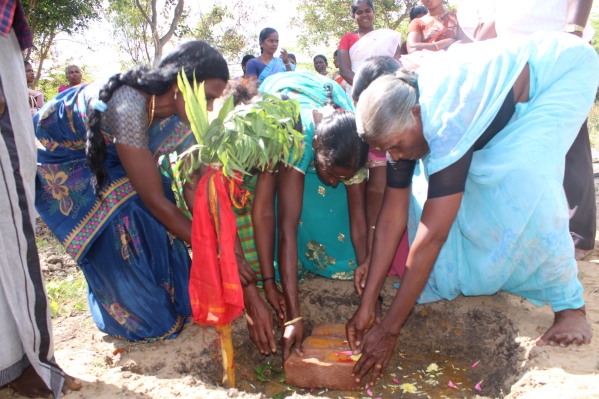The Widows Livelihood Rights Association

In the process of empowering the members of Kalangarai-sponsored micro-credit self-help groups, a movement was launched under the banner ‘Movement for the Livelihood Rights of Widows & Deserted Women. The movement had its birth at the International Women’s Day Conventions organized in March 2007.
The members of the Movement proposed that the following issues should be addressed by the Indian Government: (1) social ostracism of widows, (2) lack of legal protection of the rights of widows, (3) livelihood concerns, and (4) the social and cultural prejudices against widows as women who are (a) public sex objects, (b) bring bad luck (c) pitied, and (d) without rights to live a dignified life.
Within two years, the movement picked up momentum so quickly that during the 2008 International Women’s Day celebrations, the leaders of the movement gained confidence to shoulder the entire responsibility of organizing rallies and conventions. Moving a step further, toward the end of the conventions, they were emboldened to pass the following resolutions, which obviously had political resonance:
“We demand the Government a) to come out with a law as that of ‘SC/ST Prevention of Atrocities Act’ to protect widows from verbal and physical abuse, b) to evolve a Welfare Board to look into the problems of widows, c) to provide job opportunities to youth who come forward to marry widows, and d) to take care of the education of widows’ children living below the poverty line”.
The demands, affixed with signatures of the movement leaders, were duly sent to the Chief Minister of Tamil Nadu, Minister of Social Welfare, Minister for Rural Development and Administration and the local District Collector.
After more than 10 years of advocacy on the part of Kalangarai and the Widows Federation (of which Kalangarai is the coordinating body), the state of Tamil Nadu has created a Widows Welfare Board that will focus on widows and vulnerable women, defined as those who identify as tribal, invalid, or physically challenged. This board is composed of Indian government officials such as the Secretary of the Social Welfare Department, a Parliament member, a member of the Tamil Nadu State legislative assembly, directors of the state welfare boards, other departments and an NGO representative who is working for widows. The board will meet 3-4 times per year and is budgeted Rs. 100 million (US$1.2M) to support the welfare of women and Rs. 6.1 million (USD$73k) for administration. This is remarkable, as Tamil Nadu is the first state in India to have a Widows Welfare Board, and there is funding to support its activities.


